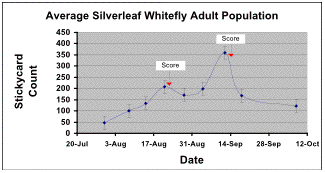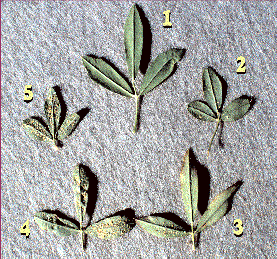Bemisia tabaci, biotype B (=Bemisia argentifolii Bellows and Perring)
L. R. Teuber, L.K. Gibbs, K.L. Taggard, C. G. Summers
PLANT CULTURE
Greenhouse
No reliable controlled environment or seedling evaluation has been developed.
FIELD ESTABLISHMENT
| Location | Evaluation is conducted in areas where the Silverleaf Whitefly is a serious pest (University of California evaluations are conducted at the Desert Research and Extension Center, El Centro, CA). Direct seed (late March or early April) and thin to single plant spacing. When plants are approximately 16 weeks old they are clipped back (late July). |
| Plot design | Plots are planted as single rows 0.6 to 1.0 m apart with plants spaced 30 cm within the row, approximately 50 plants / plot in a randomized complete block design with four replicates. Each Plot is flanked on both sides by a susceptible cultivar (we use CUF 101; see Data Analysis). |
| Culture | Maintain vigorous growth, keep nursery as weed free as possible. No insecticides are used. |
MANAGEMENT
| Clipping | Plots are clipped to correspond to the development of the silverleaf whitefly population. In the Imperial Valley, CA whitefly populations usually begin to increase rapidly between the middle and end of July (Fig. 1). Plots are rated with 28 days of regrowth. To achieve proper whitefly populations at the time of evaluation, clipping normally occurs approximately the third week of July and the third week of August. |
 Figure
1. Average silverleaf whitefly population in alfalfa at DREC
and approximate scoring dates. Figure
1. Average silverleaf whitefly population in alfalfa at DREC
and approximate scoring dates. |
| Whitefly population |
Whitefly numbers are monitored by placing yellow sticky traps in the field on a weekly basis (3 to 5 traps per replicate) and determining the average whitefly density in a 2 x 4 cm. area on each side of the trap. Average whitefly density should be approximately 150 to 200 at the time of the first rating and 300 to 350 at the time of the second rating. |
RATING
Twenty-eight days after clipping, all individual plants in a plot are
evaluated for whitefly infestation based on both number of immature whiteflies
and amount of stickiness on the stem and leaves (Table 1). The score for
immature whiteflies is assigned on the basis of observations from a single
randomly chosen stem. Stickiness is assigned on the basis of the feel
of the entire plant. Plots are rated twice approximately twenty-eight
days apart.
| Table 1. Description of scoring classes for evaluating silverleaf whitefly infestation parameters on alfalfa. | ||
| Scoring Class1 |
Immature numbers1 | Stickiness level2 |
| -- no./ cm2 -- | -- score -- | |
| 1 | 0 | None |
| 2 | <1 | Barely discernible |
| 3 | <50 | Readily discernible |
| 4 | <100 | Copious |
| 5 | >100 | Saturated |
| 1See Figure 2 for scoring
classes. 2See Figure 3 for scoring classes. |
||
An index of whitefly resistance for each plant is produced from the
unweighted average of the number of immature whiteflies and stickiness
for both scoring dates: ((stickiness date-1 + stickiness date-2) + (no.
of nymphs date-1 + no. of nymphs date-2))/4). Plot means are used for
data analysis.
 Figure 2. Scoring classes for number of immature whiteflies. |
 Figure 3. Scoring classes for amount of stickiness. |
CHECK CULTIVARS
This is a new pest and resistant cultivars are not yet available. Suggested
check materials are:
| Category | Germplasm | Approximate |
Acceptable |
| Immature whiteflies | |||
| Resistant | UC-2558 |
2.2 |
1.8 to 2.5 |
| Susceptible | UC-WF-4 |
3.8 |
3.5 to 4.5 |
| CUF 101 | 3.9 | 3.5 to 4.5 | |
| Stickiness | |||
| Resistant | UC-2558 |
2.0 |
1.8 to 2.8 |
| Susceptible | UC-WF-4 |
4.1 | 3.8 to 4.6 |
| CUF 101 | 3.9 | 3.7 to 4.5 | |
Data for each of the parameters and the index are analyzed by analysis of covariance. The covariate is the average of the two flanking check rows for each plot.
| DISTRIBUTION AND SEVERITY
OF SILVERLEAF WHITEFLY, Bemisia argentifolii Bellows and Perring  |
REFERENCES
Bellows, T.S. Jr., T.M. Perring, R.J. Gill and D.H. Headrick. 1994. Description of a species of Bemisia (Homoptera: Aleyrodidae). Ann. Entomol. Soc. Am. 87(2):195-206.
Rupert, M. E. 1995. Breeding for resistance to the silverleaf whitefly. MS Thesis, Agronomy and Range Science, University of Californa, Davis. 152p.
Teuber, L. R., M. E. Rupert, Larry K. Gibbs, K. L. Taggard. 1997. Breeding resistant alfalfa holds promise for silverleaf whitefly management. California Agriculture. 51(3):25-29.
SCIENTISTS WITH EXPERTISE
Larry R. Teuber
Agronomy and Range Science
University of California
One Shields Ave.
Davis, CA 95616
(530) 752-2461
lrteuber@ucdavis.edu
Charlie G. Summers
Department of Entomology
University of California
One Shields Ave.
Davis, CA 95616
(559) 646-6564
chasum@uckac.edu